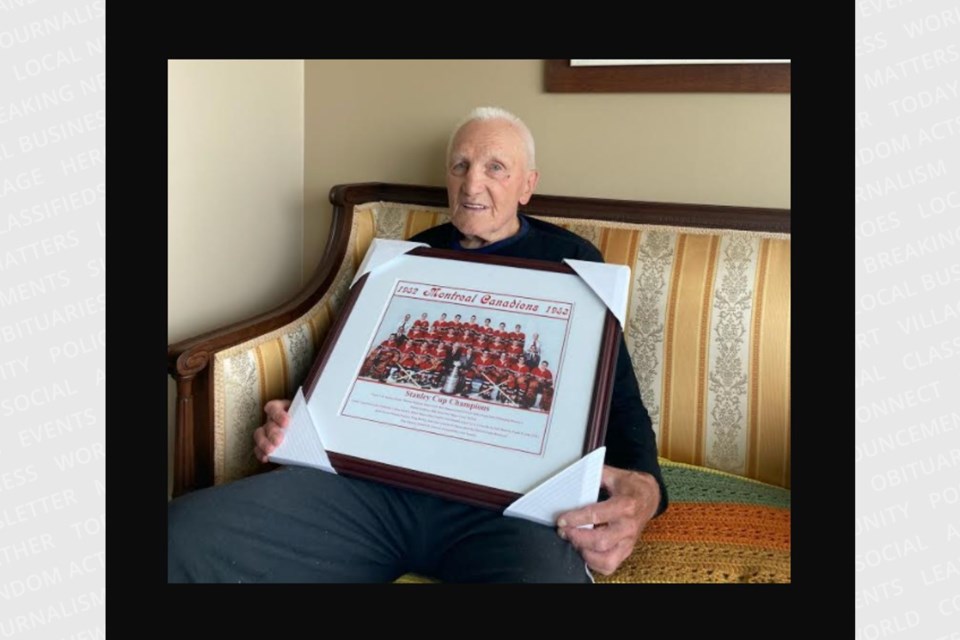For much of his later life, area resident Paul Masnick had forsaken television and sleeping in a conventional bed, but he owned something most men would covet more than any creature comfort: a Stanley Cup ring.
Masnick, who was believed to be the oldest surviving member of the Montreal Canadiens to win the hallowed vase, died Saturday. He was 92 years old.
Masnick, who lived in Barrie for most of his final years, would have turned 93 next month. He was teammates with longtime Barrie resident Paul Meger on the Habs 1953 Stanley Cup championship team.
Meger came to the area to play for the junior Barrie Flyers and never left, while Masnick moved around North America during his playing career and later to work before settling in Barrie in the final 15 years of his life to be closer his longtime partner and her extended family.
When Meger died in 2019, Masnick assumed the title as elder statesman among Montreal's Stanley Cup champions. Both men also played together on the 1950-51 Habs, a team that made it to the final that ended when Bill Barilko scored the overtime winner for the Toronto Maple Leafs.
That goal was later immortalized in The Tragically Hip’s song Fifty-Mission Cap.
“I remember (Habs coach) Dick Irvin was mad as hell when Barilko scored,” Masnick recalled in a 2021 interview.
“It was like a sweeping backhand,” he added of the broken play.
A year later, Masnick scored the OT winner against the Boston Bruins to clinch a spot in the 1952 Stanley Cup final that the Habs ended up dropping to Gordie Howe’s Detroit Red Wings.
Montreal, and Masnick, won the Cup a year later with series victories over Boston in the final and the Chicago Black Hawks in the semis.
Born in the small Saskatchewan hamlet of Wakaw, Masnick spent most of his youth in Regina after his mother died and the family farm was lost in the Depression.
He became a star with the Regina Pats, helping them to the Memorial Cup final in 1950, where they lost to the Montreal Jr. Canadiens, a team that had his future Habs teammates Dickie Moore and Don Marshall.
Masnick turned professional soon after and spent 13 seasons split between the NHL, the Western Hockey League and the International Hockey League.
In addition to the Habs, he also played for the Black Hawks and Leafs. After leaving the NHL, he won an IHL title with St. Paul Saints under legendary coach Fred Shero.
In total, Masnick played 232 NHL games, scoring 18 goals and adding 42 assists. He also scored four goals and five assists in 31 playoff games, all with the Habs, often handling a bigger role than he did during the regular season.
Perhaps more than his numbers, Masnick made his mark with his unique take on life and the strict regimen he followed to live it to the fullest. To cite just one example, he slept in his waterfront condo on a makeshift “bed” that had the consistency of a yoga mat. It was essentially a custom-made sleeping bag.
“Good for circulation,” he said, with a sparkle in his eye, understanding that a man almost 90 sleeping on the floor was, well, strange.
He didn’t own a television, instead passing the time by playing the markets, listening to classical music, walking, working out and following a strict diet. Although, he did enjoy an occasional beer.
“There is no wealth without health,” he said from his hospital bed at Royal Victoria Regional Health Centre (RVH) after a fall while exercising in 2022. “You can’t have one without the other and no one can give you health – you have to earn it yourself.”
Right from his days as an elite amateur, Masnick had firm beliefs regarding how his services should be compensated. He originally declined Habs GM Frank Selke’s offer of $300 to sign, betting on himself that he could do better if he played well in his final year of junior hockey.
And he did. Masnick signed for much more after the Memorial Cup run that included him scoring the winning goal to get there. The $2,500 deal was struck in Regina’s Saskatchewan Hotel, which today remains a venue where the province’s movers and shakers meet, just like they did back then.
“I believe in fair trade,” he said of him placing more value than the Habs originally were offering, but also on the keen business sense that he picked up later when he earned a university degree while playing in St. Paul, Minn.
Once Masnick wrapped up his professional career, he never played again. Not even recreationally.
When asked to recall his last visit the Montreal Forum, Masnick couldn’t remember exactly, saying that he assumed it was when he last played there.
He did recall his last time in the city – to play in a tennis tournament about 30 years ago. He ran into 'Pocket Rocket' Henri Richard.
Masnick never visited the Bell Centre and it never crossed his mind to ask for an invitation, either, to its opening, or the Forum’s closing.
He had moved on, but he never forgot his time in pro hockey, especially the special connection he shared with fellow Saskatchewan players such as Meger, who was two years his senior.
Though a contemporary, he acknowledged he looked up to Howe more than any other player, and he cited Jean Beliveau as his most talented teammate.
His telling of stories about winning the Cup and of the Original Six NHL sounded like sepia tone hopping off the page and coming to life.
“I remember the celebration,” Masnick said of the 1953 Stanley Cup win. “The relief of winning and living downtown in Montreal…
"I remember Doug Harvey came down (to my room). He wanted to keep the party going. And we did.”



